It is an anniversary one does not celebrate, but mourn. The pain is still fresh — piercing and overwhelming for the loved ones of the nine Washington, D.C.-area residents killed in the crash of two red-line Metro trains near the border of D.C. and Maryland on June 22, 2009.
In our grief, we realize that accidents do happen, that even terrible mishaps, which snatch away lives and devastate those of us left behind, cannot always be prevented.
But out of love of life — for both those departed and those remaining, including the 70 who were injured — we ought to seek a transit system, an economic system and a political order that will render such tragedies as unlikely as possible.
Yet, on the one-year anniversary of the worst train accident in the Washington-area Metro transit system’s 34-year history, the Washington Post headline reads: “Few gains in safety since Metro crash.” In fact, the headline is only too optimistic. The story informs that since the crash “the transit authority’s safety record has worsened.”
“We don’t want death by Metro any longer,” states U.S. Senator Barbara Mikulski (D-Maryland). But after a year, the Washington Metropolitan Area Transit Authority seems no closer to (and perhaps even further away from) solving their safety problems.
Deborah Hersman, chairwoman of the National Transportation Safety Board, argues that there are “significant deficiencies in their safety culture,” and points out that, “The most disappointing . . . is when we issue recommendations and those issues do not get corrected. For us, that is a big concern about Metro.”
Recommended
Since the D.C.-area transit system doesn’t appear to be taking any advice from the NTSB or others, the Obama Administration favors a federal takeover of regulatory and oversight functions for local transit systems — something now under consideration by Congress. On paper, that might sound like a more protective approach on paper. But isn’t it really passing the buck to the same federal regulatory regime that is now impressing the entire planet with its oversight of oil drilling in the Gulf of Mexico?
Might not local transit systems get the same winks and nods historically reserved for certain deep-water drillers?
Others argue that if only the Metro system had greater and more stable funding these problems could be solved. But if throwing money at problems were the same thing as solving them, our panoply of local, state and federal governments would have ushered in nirvana many moons ago.
The Washington-area Metro system faces a myriad of troubles, but behind and beneath them all lies the specter of profit. A lack of profit.
Oh, I know we’re used to hearing profit attacked, attached to greed — all that “people before profits” stuff. But without profits, products cannot be produced, nor services rendered.
Even subsidies cannot be maintained except for the ability to tax profitable economic activity to subsidize unprofitable endeavors. (I realize this is Econ 101 for most folks, but transportation experts need to hear this.)
Many years ago, I knew trouble was brewing when a newspaper report stopped me cold. It mentioned and moaned about a critical new problem for the Metro system: Too many riders!
When on earth does a business complain about lots of new paying customers?!
When it isn’t really looking to make a profit, and instead receives its lifeblood through taxpayer subsidy, making every new “customer” an unfunded liability.
So, today, without any incentives related to turning a profit, the service of a Metro train ride is underpriced and over-used. The income from more riders doesn’t cover the cost of maintenance to keep the system working efficiently, and most of all, keep riders and operators safe.
If Metro were profitable, an accident would not only produce ugly headlines and ill-will among the public, but potentially significant financial penalties.
Better safety would follow.

























Join the conversation as a VIP Member